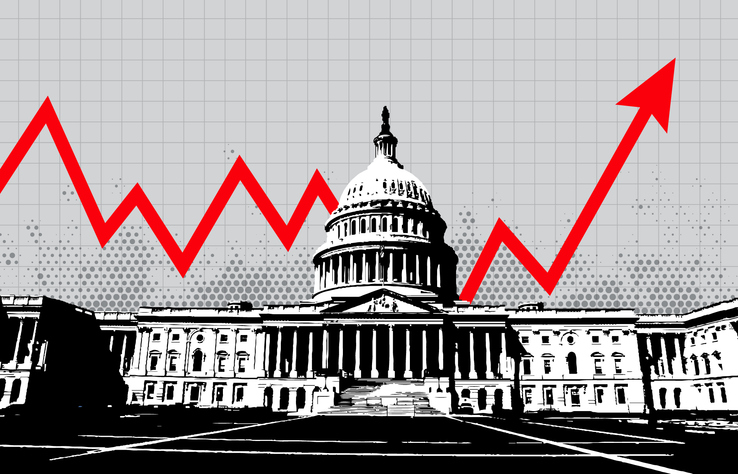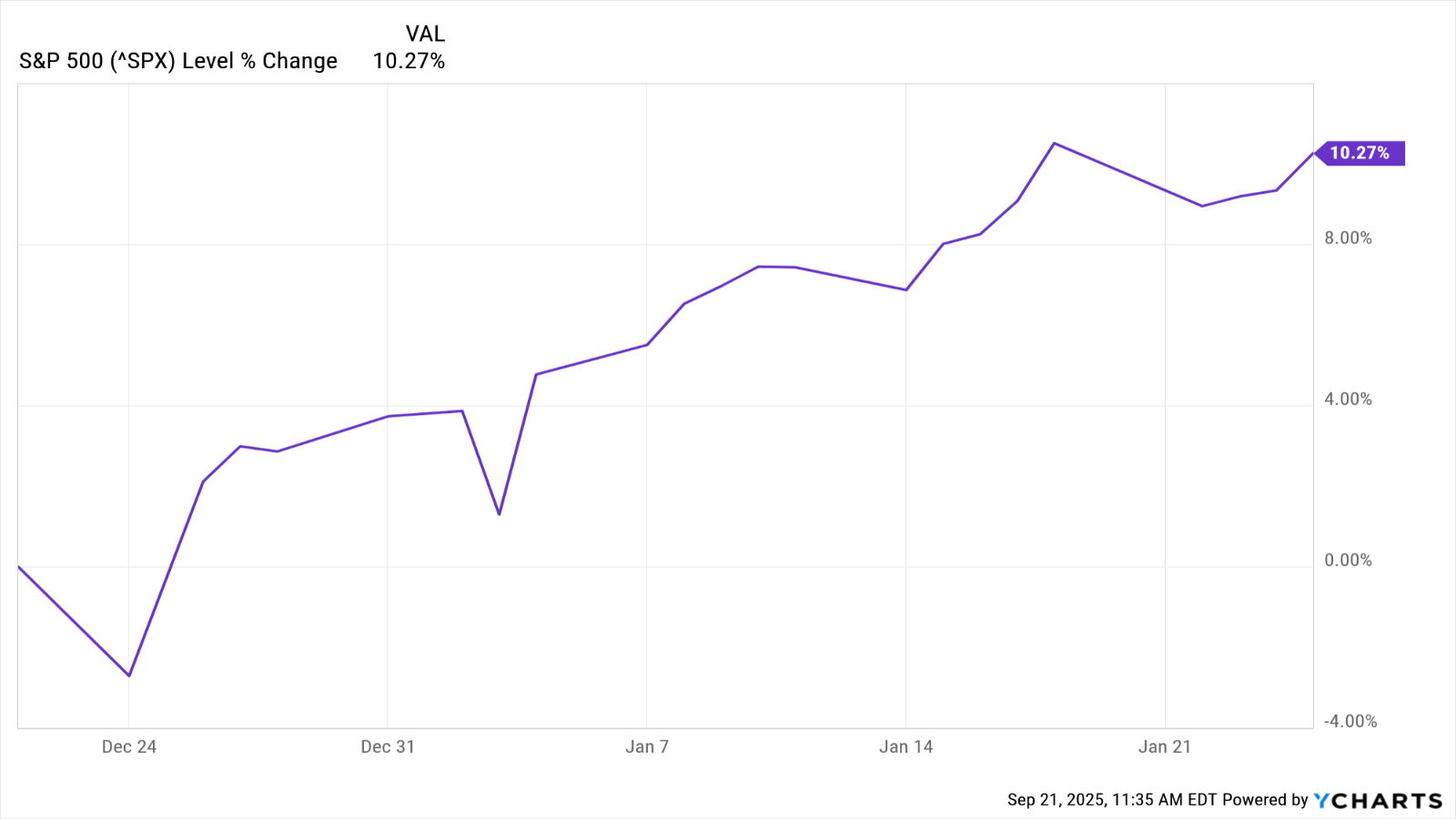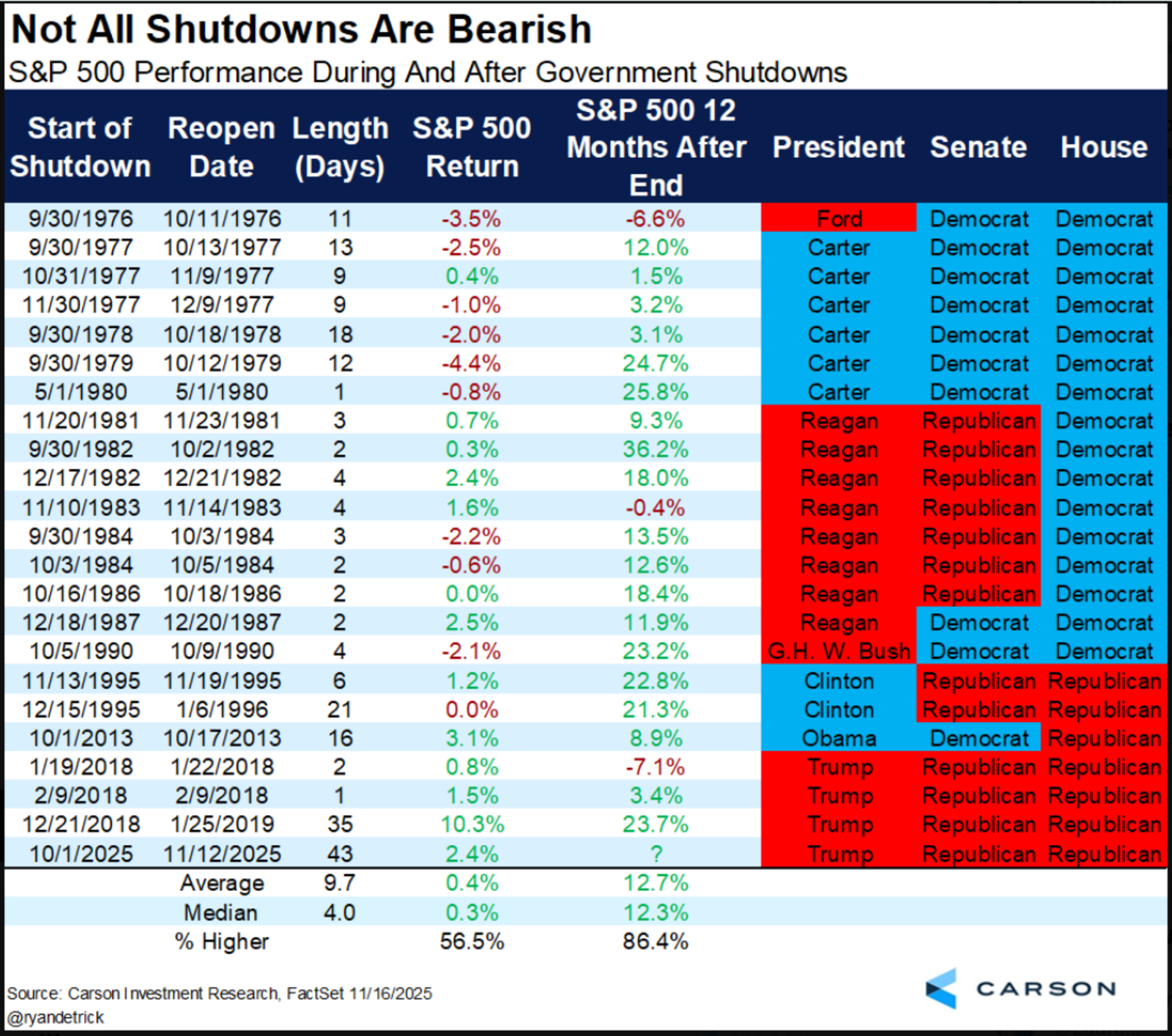What Does a Government Shutdown Mean for Stocks?
A federal government shutdown doesn't spell doom for stocks.

Profit and prosper with the best of Kiplinger's advice on investing, taxes, retirement, personal finance and much more. Delivered daily. Enter your email in the box and click Sign Me Up.
You are now subscribed
Your newsletter sign-up was successful
Want to add more newsletters?

Federal government shutdowns aren't bad for stocks, at least historically speaking.
Although the market generally doesn't like the threat of a federal governmewhnt shutdown, the S&P 500's performance during past closures has been pretty good.
Not that we needed another "funding cliff." Washington is heading toward a partial shutdown if the Senate doesn't approve a $1.2 trillion spending bill by midnight on Friday, January 30, 2026.
From just $107.88 $24.99 for Kiplinger Personal Finance
Become a smarter, better informed investor. Subscribe from just $107.88 $24.99, plus get up to 4 Special Issues

Sign up for Kiplinger’s Free Newsletters
Profit and prosper with the best of expert advice on investing, taxes, retirement, personal finance and more - straight to your e-mail.
Profit and prosper with the best of expert advice - straight to your e-mail.
If the threat of a shutdown seems particularly irksome at the moment, it might be because we just had a 43-day total government shutdown a few months ago.
Meanwhile, markets are trading at record levels – and rich valuations – despite the effects of tariffs, above-target inflation and a softer labor market. No one wants dysfunction in Washington to rattle already tense nerves.
Stock performance during government shutdowns
Happily, for market participants, the historical record for stocks when the federal government shuts down is far from one of doom and gloom.
There have been 23 government shutdowns since 1976, but on only five occasions were operations affected for more than one business day, writes Jeffrey Buchbinder, chief equity strategist at LPL Financial. That leaves us with only five "true" shutdowns, Buchbinder notes.
It's tough to remember now, but the S&P 500 returned 10.3% during the 35-day shutdown of 2018-2019. Have a look at the chart below:

Stocks did fine during the extended shutdown of 2025, too, as the S&P 500 gained 2.4%.
It's sort of counterintuitive, but in past government shutdowns, the S&P 500 rose 57% of the time, generating an average return of 0.4%, according to data from Carson Group.
Even better, 12 months after the end of the shutdown, the S&P 500 was higher 86% of the time, with an average return of 12.7%.

"The good news is history says shutdowns have little to no effect on stocks," writes Carson Group Chief Market Strategist Ryan Detrick. "Most shutdowns last only a few days, so just enough to get in the headlines, and then it is over just as quickly."
Past performance is no guarantee of future results, but the record for stocks in government shutdowns is almost encouraging.
Related content
Profit and prosper with the best of Kiplinger's advice on investing, taxes, retirement, personal finance and much more. Delivered daily. Enter your email in the box and click Sign Me Up.

Dan Burrows is Kiplinger's senior investing writer, having joined the publication full time in 2016.
A long-time financial journalist, Dan is a veteran of MarketWatch, CBS MoneyWatch, SmartMoney, InvestorPlace, DailyFinance and other tier 1 national publications. He has written for The Wall Street Journal, Bloomberg and Consumer Reports and his stories have appeared in the New York Daily News, the San Jose Mercury News and Investor's Business Daily, among many other outlets. As a senior writer at AOL's DailyFinance, Dan reported market news from the floor of the New York Stock Exchange.
Once upon a time – before his days as a financial reporter and assistant financial editor at legendary fashion trade paper Women's Wear Daily – Dan worked for Spy magazine, scribbled away at Time Inc. and contributed to Maxim magazine back when lad mags were a thing. He's also written for Esquire magazine's Dubious Achievements Awards.
In his current role at Kiplinger, Dan writes about markets and macroeconomics.
Dan holds a bachelor's degree from Oberlin College and a master's degree from Columbia University.
Disclosure: Dan does not trade individual stocks or securities. He is eternally long the U.S equity market, primarily through tax-advantaged accounts.
-
 4 High-End Experiences Worth the Splurge After 50
4 High-End Experiences Worth the Splurge After 50These curated date ideas provide the perfect backdrop for couples ready to enjoy the very best that the world has to offer.
-
 Health Care Stocks Have Sagged. Can You Bet on a Recovery?
Health Care Stocks Have Sagged. Can You Bet on a Recovery?The flagging health care sector has perked up a bit lately. Is it time to invest?
-
 Costco's Auto Program: Can Membership Pricing Really Save You Money on a Car?
Costco's Auto Program: Can Membership Pricing Really Save You Money on a Car?Costco's Auto Program can simplify the car-buying process with prearranged pricing and member perks. Here's what to know before you use it.
-
 Health Care Stocks Have Sagged. Can You Bet on a Recovery?
Health Care Stocks Have Sagged. Can You Bet on a Recovery?The flagging health care sector has perked up a bit lately. Is it time to invest?
-
 Your Retirement Age Is Just a Number: Today's Retirement Goal Is 'Work Optional'
Your Retirement Age Is Just a Number: Today's Retirement Goal Is 'Work Optional'Becoming "work optional" is about control — of your time, your choices and your future. This seven-step guide from a financial planner can help you get there.
-
 Have You Fallen Into the High-Earning Trap? This Is How to Escape
Have You Fallen Into the High-Earning Trap? This Is How to EscapeHigh income is a gift, but it can pull you into higher spending, undisciplined investing and overreliance on future earnings. These actionable steps will help you escape the trap.
-
 I'm a Financial Adviser: These 3 Questions Can Help You Navigate a Noisy Year With Financial Clarity
I'm a Financial Adviser: These 3 Questions Can Help You Navigate a Noisy Year With Financial ClarityThe key is to resist focusing only on the markets. Instead, when making financial decisions, think about your values and what matters the most to you.
-
 Dow Absorbs Disruptions, Adds 370 Points: Stock Market Today
Dow Absorbs Disruptions, Adds 370 Points: Stock Market TodayInvestors, traders and speculators will hear from President Donald Trump tonight, and then they'll listen to Nvidia CEO Jensen Huang tomorrow.
-
 Private Capital Wants In on Your Retirement Account
Private Capital Wants In on Your Retirement AccountDoes offering private capital in 401(k)s represent an exciting new investment opportunity for "the little guy," or an opaque and expensive Wall Street product?
-
 It's Time to Bust These 3 Long-Term Care Myths (and Face Some Uncomfortable Truths)
It's Time to Bust These 3 Long-Term Care Myths (and Face Some Uncomfortable Truths)None of us wants to think we'll need long-term care when we get older, but the odds are roughly even that we will. Which is all the more reason to understand the realities of LTC and how to pay for it.
-
 Fix Your Mix: How to Derisk Your Portfolio Before Retirement
Fix Your Mix: How to Derisk Your Portfolio Before RetirementIn the run-up to retirement, your asset allocation needs to match your risk tolerance without eliminating potential for growth. Here's how to find the right mix.